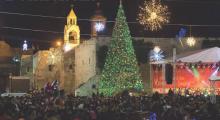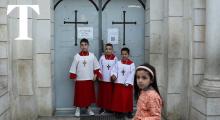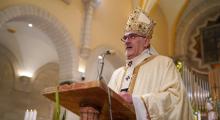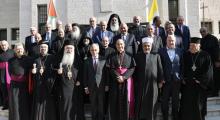Issued by the Catholic Center for Studies and Media - Jordan. Editor-in-chief Fr. Rif'at Bader - موقع أبونا abouna.org
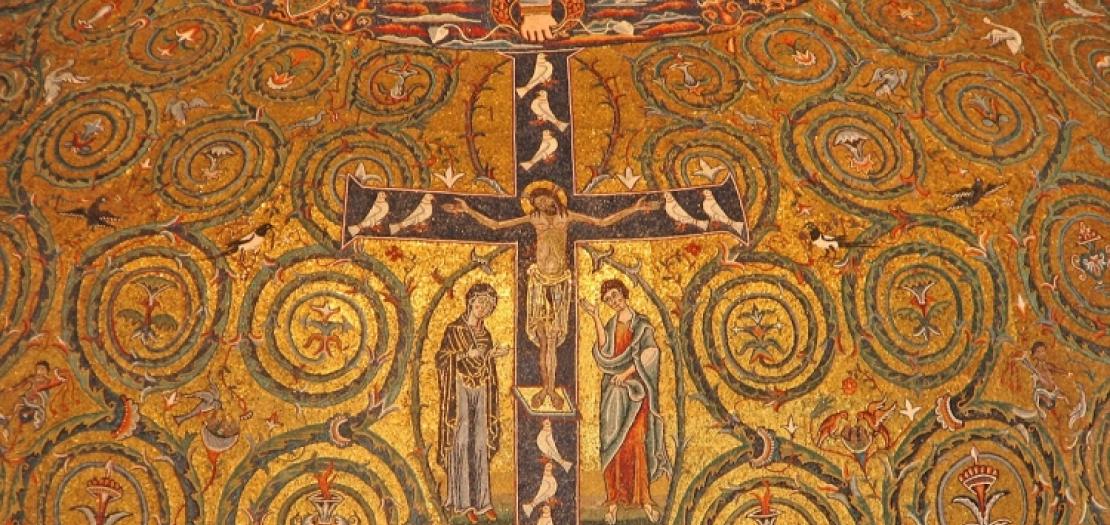
Following is the text of the meditation by Cardinal Pierbattista Pizzaballa, Latin Patriarch of Jerusalem: The 11th Sunday of ordinary time dated June 16, 2024:
Last Sunday’s Gospel passage ended with Jesus’ gaze resting on those around him. (Mark 3:34) It is a gaze capable of seeing beyond what is apparent: Jesus looks at the people listening to him, and sees in them brothers, sisters, and mothers.
He looks at people and sees a relationship, he sees the bond that unites them in depth.
This bond is the ripened fruit of faith: Faith is not just believing in revealed truths, but entering into a life-changing relationship, and accessing a new identity that can no longer think of itself outside of a relationship with the Lord and with one's brothers and sisters.
Today's Gospel (Mark 4:26-34) is a passage with two parables, both inspired by the agricultural setting, by which the Lord speaks of the Kingdom, namely, the relationship we previously talked about, because the Kingdom of Heaven is a relationship of love that unites people into one life, the life of God.
Today’s parables tell us how this happens, and what are the steps needed for the seed to ripen and bear fruit.
The first thing we can notice is that the initiative always comes from God. (Mark 4:27)
The whole history of salvation testifies to this: it is always God who takes the initiative of the covenant with man. Man alone could never assume the possibility of this covenant, this relationship of love. Then it is God who undertakes to sow the seed of covenant and love into history.
The Kingdom begins with a seed that we do not yield, but rather given to the earth with absolute gratuitousness.
It is not man, in his strength, who produces the fruit: it is God who takes the initiative to place in the earth the seed of his life.
Then, the seed is God's; but, even better, the seed is God himself.
God chooses to make his life a seed placed in the earth of Mankind, so that this earth may flourish and bear fruit, which is not simply a fruit of human life, but a fruit of divine life.
Jesus himself is the seed that lies in the ground to give life, through his death and resurrection.
Thus, the seed that can give life to the world is Easter: the place of salvation where God's life is sown in every life.
The seed has some definite characteristics: it is very small, (Mark 4:32) and therefore seemingly insignificant and powerless. This is the way chosen by God: because he decides to put his life in a seed, then the path will never be that of strength, power, or visibility. The path of the Kingdom will always be that of humility because love could never express itself otherwise.
But what then makes the seed so strong?
The seed is small, but it is alive, and that is its strength.
It is alive with a life that has gone through death, so paradoxically, precisely by dying in the ground, it will bear fruit.
On the one hand, the seed, but on the other, the Earth, (Mark 4:31) the earth alone would indeed produce no fruit, the same is true of the seed: the seed needs the earth, just as God needs man.
But what is the task of the Earth?
The Earth's task, that is, man's task, is to receive the seed, to cherish it.
It would seem to be a secondary, exclusively passive task, but this is not so: to receive is an active, dynamic verb, because it implies, in some way, letting one's life be transformed.
To cherish means to let it live within oneself. This is an expression of love: only if one loves the seed does one make it flourish within oneself.
And finally, there is the ripe fruit (Mark 4:28): but the good fruit is an ear of wheat which is again other seeds. The ripe fruit means to become individuals who carry within themselves the life of God, his being becomes a seed, an Easter, a gift for others.
Indeed, in the second parable, the ripe fruit is compared to a tree, capable in turn of welcoming and cherishing the life of others. (Mark 4:32)
God, therefore, has an unshakable trust in man; and when He sets his gaze on us, He sees this: The ripe fruit of charity, of bonds stronger than those of blood, which make us brothers, sisters, and mothers.
+Pierbattista


